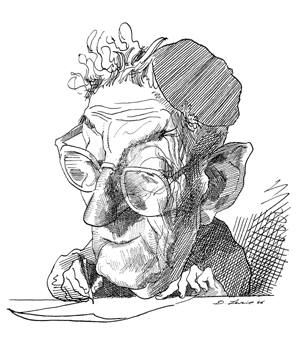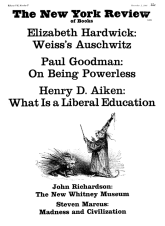Agnon is a commanding figure, as gifted and eloquent as his admirers claim. Or so I would judge from what I know of his work in English. One has to enter the face-saving proviso much earlier in his case than one normally would with a novelist encountered only in translation, partly because he writes with the intensity and idiomatic richness of a poet, partly on account of his quasi-religious attitude towards Hebrew. No doubt the two factors overlap, since to write authentic poetry is by definition to reverence the language you happen to use. When Paul Valéry celebrates the “Honneur des Hommes, Saint LANGAGE,” one can reasonably assume that he is thinking in the first place of French, not of some hypothetical lingua franca. Still, it does make a big difference that Agnon’s “saint langage” should be one which until fairly recently was regarded by the bulk of those who understood it as quite literally lashon hakodesh, the holy tongue. He is a highly civilized man, incapable of boorish flag-wagging chauvinism, but he has plainly inherited a sense of sacred obligation about the use of Hebrew. To an unusual degree, the medium is the message, and presumably the most a translation can do is give the reader some idea of how much he is missing.
A related difficulty, for a Western audience, is that few of us are likely to know much about the religious background against which Agnon works. The Bible, at any rate, is familiar—well, kind of. Rumors of Hasidism may have percolated down through a paperback or two. But what about the boundless sea of the Talmud, the Cabbalists, the medieval poets, the commentators, the commentaries on the commentators? Agnon doesn’t just draw on this tradition: it is his natural element, the air he breathes. A puzzling individual reference can of course always be cleared up in an editorial footnote; what is much harder to grasp is the internal coherence of his world as a whole. Taken out of their living context, for instance, his supernatural motifs are liable to seem merely bizarre, if not repellent, and the customs he describes merely picturesque. He is well aware of the problem himself. In one of the stories in this volume there is a character who protests against turning “the ways of our fathers into—folklore,” who has come to find the very sound of the word “folklore” detestable. Unfortunately, however, a folklorist, an outside observer, is exactly what the foreign reader of Agnon often feels.
IT SAYS A GREAT DEAL for Agnon’s mastery that in spite of these formidable obstacles so much of his poetry should come across. In the first of his Two Tales, “Betrothed,” one is held from the very start by the slight story-teller’s lilt and the serene authority of the narrative flow. The setting is Jaffa in the days before the First World War, sunlit spacious days “many times longer than ours.” Jacob Rechnitz is a young schoolteacher from Vienna who has been able to complete his studies and come to Palestine thanks to the benefactions of a wealthy neighbor, Consul Ehrlich; in his spare time he is a distinguished marine biologist, an expert on seaweed. A group of half-a-dozen girls gather round him—inseparable companions, any one of them might become his bride. Then the Consul, on a foreign tour with his daughter Susan, turns up for a stay in Jaffa. Susan reminds him that when they played together as children they swore to marry each other, and he willingly agrees to keep his word. Yet somehow he lets the weeks drift by, and when Susan falls ill with sleeping sickness he is secretly glad: He is his own master again, free to concentrate on his research without distraction. The offer of an academic post comes from America, and he gets ready to leave. But one evening the six girls, the former members of his little set, call on him and take him down to the beach. In a final dream-like sequence, they decide to run a race: Rechnitz is to present a garland of dried seaweed to the winner. He hurries to the finishing-post, and when he gets there finds Susan, risen from her sick-bed, waiting to claim the garland.
As a hero Rechnitz inspires mixed feelings. He shows up at his best alongside the Consul, who is worldly, Westernized, outwardly imposing, inwardly rather coarse. By comparison Rechnitz is the dedicated student, all the more so since the seaweed he studies is of no apparent commercial value to anyone. Seen from another angle, however, he is weak, passive, irresponsible; deluded in thinking that he can be self-sufficient. Even his scientific vocation, he eventually realizes, was not really a free choice. It was decided for him long ago, on the day in childhood when he pledged himself to Susan. On the same day he also fell in love, so to speak, with the strange plants in the pond in her father’s garden. Try as he will to escape, his whole life is bound up with another person’s. “Betrothed” is too weak a title to convey the force of the commitment that pins him down: “A Deep-Sworn Vow” would come nearer to it.
Advertisement
In a helpful introductory note Mr. Allen Mandelbaum suggests that “Betrothed” can be taken as an ironical gloss on Pascal’s famous observation that “all the unhappiness of men arises from the fact that they cannot stay quietly in their own room.” Jacob Rechnitz is able to achieve happiness only by leaving his room, abandoning his isolation. On the other hand Agnon is completely at one with Pascal, according to Mr. Mandelbaum, in “Edo and Enam,” the second story in the book. Trouble starts the moment you can’t sit still.
“EDO AND ENAM” is a much tougher nut to crack than “Betrothed,” and I’m not sure that I’ve got through to the kernel even now. But at least it is indisputable that the disasters with which the story culminates begin when Gerhard and Gerda Greifenbach leave Jerusalem for a trip abroad, hoping “to rest awhile from the strain of life in our country.” They ask the narrator, an old friend, to keep an eye on the house while they are away; they have one lodger, Dr. Ginath, a scholar famous for his “Grammar of the Edo Language” and his discovery of the mysterious Enamite Hymns, but he hardly ever uses his room. While spending the night there the narrator is sought out by Gamzu, a bookseller of his acquaintance. Gamzu is worried about the disappearance of his wife Gemulah, who is a somnambulist. Gemulah belongs to a remote tribe—Gamzu first met her in the mountains, singing a strange unearthly song—and in the end it turns out that she has been visiting Ginath, who transcribes whatever she dictates. Gamzu wrests her away from the scholar, but the following month she returns to him. There is an obscure accident, and both Ginath and Gemulah fall to their death. On the day they are buried the Greifenbachs return, blithely unaware of everything that has happened.
It will not have escaped notice that most of the names in the story alliterate. Many other examples could be given. Gerhard and Gerda naturally read Goethe; Gerhard has picked up what Hebrew he knows from Gesenius’s grammar; the former occupants of their house include a splinter-group of the Gemeinshaft der Gerechten, a manufacturer of Gouda cheese, and a man from Glasgow. We are confronted, in fact, with the Comedian as Letter G (or rather, gimel). The effect is deliberately Grotesque, as though to emphasize the arbitrary fantastic patterns into which life can twist itself. It also heightens the impression of listening to a tall story, in which one extravagance is defiantly capped by the next. There is a touch of the Arabian Nights about “Edo and Enam,” of fabulous invention for its own sake. But this shouldn’t blind one to the somber undertones, the nagging sense of futility to which Mr. Mandelbaum draws attention.
THE THEME OF RESTLESSNESS is exemplified most immediately by the Griefenbachs, who are never quite at ease in Zion. They are a cultured, methodical, slightly pompous couple; although Agnon is much too polite to say so, in their amiable way they have more than a dash of the stock Israeli caricature of the German Jew, the yekke. Their peregrinations also call to mind the globe-trotting Herr Consul in “Betrothed.” Agnon’s artistic treatment of German and Western Jews is a complex matter (it is discussed at length in a fascinating article by the Israeli critic Baruch Kurzweil, which can be found in Volume VI of the Leo Baeck Year Book), and there is no question here of a narrow nationalism. On the contrary, when Agnon talks about “those who wander about like the shades of night,” he says explicitly that he isn’t thinking of the Greifenbachs in particular—“I refer to all men who are in the grip of this earth.” Everyone in the story—the narrator’s family, the pious Gamzu, the sleepwalking Gemulah—seems nomadic or footloose. Set off against the Greifenbachs, who leave their house empty, are the unknown couple who flit across the narrative from time to time, looking for somewhere to live: married for over a year, they have still to spend a night together. When a character quotes the proverb. “Your happiness is where you are not,” it is made to cut both ways: What it expresses is both “a first law of our experience and a mocking illusion.” And in a world as feverish as the one he portrays, Agnon can even find a kind word for the oppressive curfew laws of the Mandate:
Advertisement
People were obliged to stay at home and as a result gave thought to their wives and children, which they had not been accustomed to doing when they spent their evenings at assemblies, councils, meetings and the like, all of which estrange a man from himself, and needless to say from his family.
It might seem as though he were recommending quietism, complete withdrawal. But characteristically he adds:
You might even say that public affairs benefited; with fewer meetings and debates things worked out in their own way, and in spite of all turned out for the best.
With whatever skeptical reservations, he still takes it for granted that he belongs to a community, and that politics are a sad necessity. Similarly, when he talks about men being estranged from themselves, every fashionably alienated bosom returns an echo. But Agnon’s brand of pessimism is as old as Ecclesiastes, and though his world is out of joint it still contains positive values. In “Edo and Enam” they are embodied in Dr. Ginath, the publicity-shunning scholar. After his death it is discovered that he has burned all his manuscripts, and left instructions that neither the Edo grammar nor the Enamite Hymns should be reprinted. But his orders are disregarded, and his posthumous fame spreads—impersonally, not on account of who he was but of what he accomplished. “His soul shines out” (the phrase doubtless reads more naturally in the original); and Agnon, though under no illusions about the prevailing darkness, tries at the end, like Auden in a famous poem, to “show an affirming flame.”
This Issue
November 3, 1966




